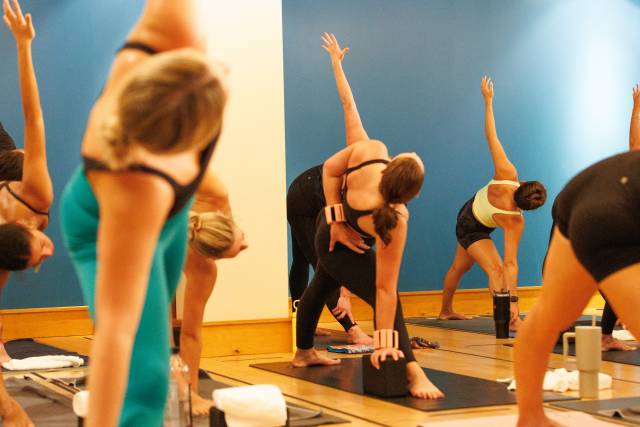The Connection Between Yoga and Mental Health
Yoga, an ancient practice combining physical postures, breathing exercises, and meditation, has gained significant popularity in recent years. While many people turn to yoga for its physical benefits, such as improved flexibility and strength, its impact on mental health is equally remarkable. This blog post delves into the profound connection between yoga and mental well-being, focusing on its benefits for anxiety and depression.
Examining the Mind-Body Connection
The foundation of yoga lies in the understanding that our mind and body are interconnected. This holistic approach to health recognizes that physical practices can significantly influence our mental state, and vice versa. When we engage in yoga, we’re not just moving our bodies; we’re also cultivating awareness, mindfulness, and a sense of inner calm.
For individuals struggling with anxiety and depression, this mind-body connection can be particularly powerful. Anxiety often manifests as physical tension, racing thoughts, and shallow breathing. Depression, on the other hand, can lead to lethargy, lack of motivation, and a disconnection from one’s body. Yoga addresses both the physical and mental aspects of these conditions, offering a comprehensive approach to healing.
Yoga and Its Impact Upon Anxiety
Anxiety can feel like a constant state of worry and unease. It’s as if your mind is stuck in a loop of “what-ifs” and worst-case scenarios. Yoga provides several tools to help break this cycle and bring about a sense of calm and control.
One of the primary ways yoga helps with anxiety is through its emphasis on breath work. Many yoga practices incorporate specific breathing techniques, known as pranayama, which can help regulate the nervous system. Deep, slow breathing activates the parasympathetic nervous system, often referred to as the “rest and digest” mode. This counteracts the “fight or flight” response associated with anxiety, leading to a more relaxed state.
Additionally, the physical postures in yoga can help release tension stored in the body. Anxiety often causes us to hold stress in our muscles, particularly in areas like the shoulders, neck, and jaw. Gentle stretching and movement can help release this physical manifestation of anxiety, promoting a sense of ease and relaxation.
The mindfulness aspect of yoga is another powerful tool for managing anxiety. By focusing on the present moment – the sensation of your breath, the feeling of your feet on the mat – yoga helps redirect attention away from anxious thoughts about the future. This practice of present-moment awareness can be carried off the mat and into daily life, providing a valuable coping mechanism for anxiety.
The Benefits of Yoga for Depression
Depression can make even the simplest tasks feel overwhelming. It can drain your energy, dampen your mood, and make you feel disconnected from yourself and others. Yoga offers a gentle yet effective way to combat these symptoms and improve overall well-being.
One of the most immediate benefits of yoga for depression is its ability to boost mood. Physical activity, even gentle movement, releases endorphins – the body’s natural “feel-good” chemicals. Regular yoga practice can lead to increased levels of serotonin, a neurotransmitter associated with feelings and general attitude of happiness and well-being.
Yoga also promotes self-awareness and self-acceptance. Many people with depression struggle with negative self-talk and low self-esteem. The non-judgmental nature of yoga encourages practitioners to observe their thoughts and feelings without criticism. This can help break the cycle of negative thinking often associated with depression.
The social aspect of attending yoga classes can also be beneficial for those with depression. While it’s possible to practice yoga alone, joining a class provides an opportunity for social interaction and community support. This can be particularly valuable for individuals who may be feeling isolated due to their depression.
Seeking the Guidance of a Professional Yoga Instructor
While yoga can be a powerful tool for managing anxiety and depression, it is necessary to approach your yoga practice with care and guidance, particularly if you are a beginner. Seeking out the help of experienced yoga instructors in your area is highly recommended. Your yoga instructor can ensure that you’re practicing safely and effectively, tailoring the practice to your individual needs and abilities.
Experienced yoga instructors can also help you navigate the emotional aspects of yoga practice. Sometimes, as we release physical tension, we may also release stored emotions. A knowledgeable teacher can provide support and guidance through this process, helping you to integrate these experiences in a healthy way.
For those new to yoga, starting with a beginner’s class or a gentle yoga style can be beneficial. This allows you to build a strong foundation and gradually work your way up to more challenging practices. Remember, yoga is not about perfecting poses or pushing yourself to extremes. It’s about finding balance, both on and off the mat.
Yoga & Mental Health: Managing Anxiety & Depression
The connection between yoga and mental health is profound and multifaceted. Through its combination of physical movement, breath work, and mindfulness, yoga offers a holistic approach to managing anxiety and depression. It provides tools for calming the mind, releasing physical tension, improving mood, and fostering emotional healing and inner peace.
As with any approach to mental health, it’s important to remember that yoga is not a substitute for professional medical advice or treatment. If you’re struggling with anxiety or depression, it’s always best to consult with a healthcare provider. They can help you determine if yoga might be a beneficial addition to your treatment plan.
Incorporating yoga into your life doesn’t have to be complicated or time-consuming. Even a few minutes of practice each day can make a difference. As you continue to practice, you may find that the benefits extend far beyond the mat, positively impacting various aspects of your life. Remember, every step you take towards better mental health is a step worth celebrating.







